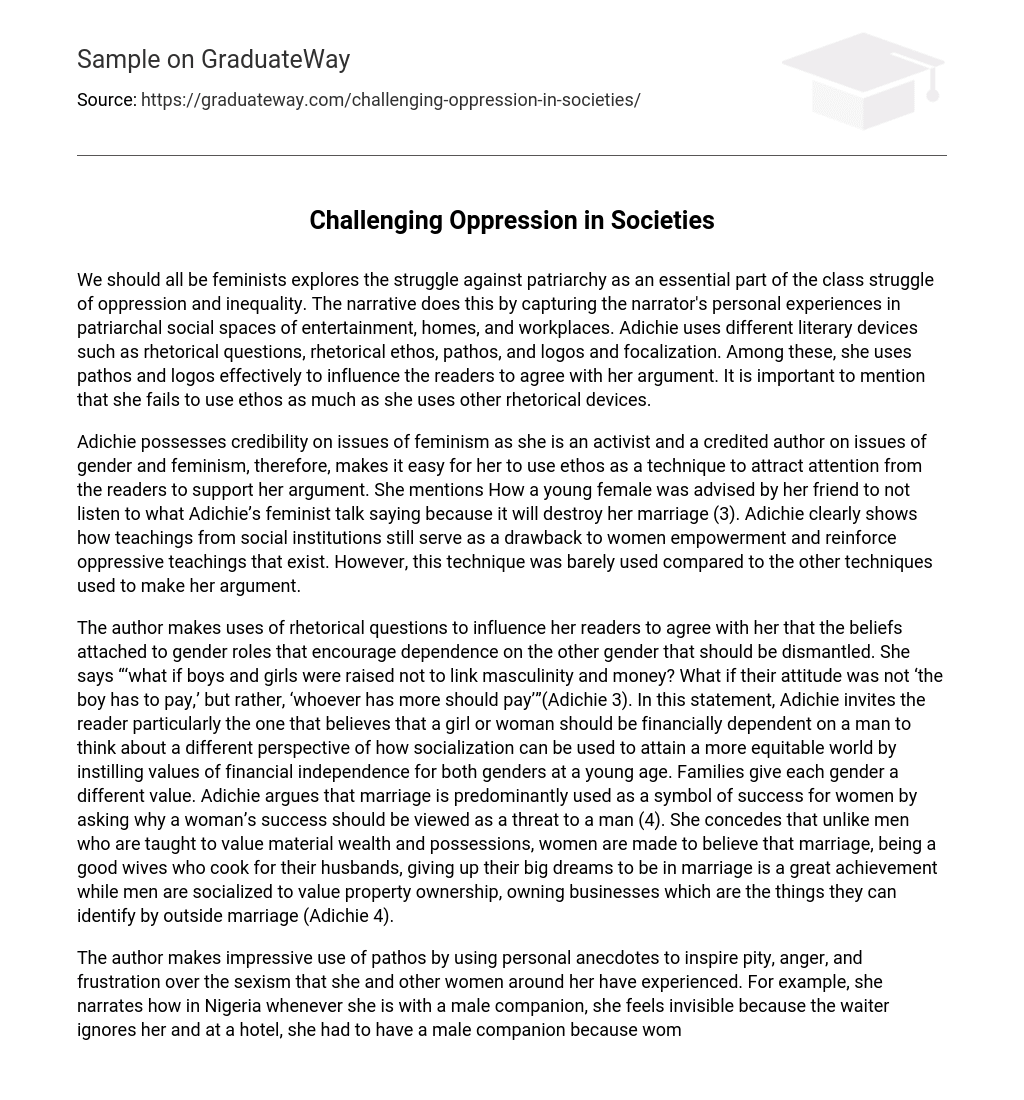We should all be feminists explores the struggle against patriarchy as an essential part of the class struggle of oppression and inequality. The narrative does this by capturing the narrator’s personal experiences in patriarchal social spaces of entertainment, homes, and workplaces. Adichie uses different literary devices such as rhetorical questions, rhetorical ethos, pathos, and logos and focalization. Among these, she uses pathos and logos effectively to influence the readers to agree with her argument. It is important to mention that she fails to use ethos as much as she uses other rhetorical devices.
Adichie possesses credibility on issues of feminism as she is an activist and a credited author on issues of gender and feminism, therefore, makes it easy for her to use ethos as a technique to attract attention from the readers to support her argument. She mentions How a young female was advised by her friend to not listen to what Adichie’s feminist talk saying because it will destroy her marriage (3). Adichie clearly shows how teachings from social institutions still serve as a drawback to women empowerment and reinforce oppressive teachings that exist. However, this technique was barely used compared to the other techniques used to make her argument.
The author makes uses of rhetorical questions to influence her readers to agree with her that the beliefs attached to gender roles that encourage dependence on the other gender that should be dismantled. She says “‘what if boys and girls were raised not to link masculinity and money? What if their attitude was not ‘the boy has to pay,’ but rather, ‘whoever has more should pay’”(Adichie 3). In this statement, Adichie invites the reader particularly the one that believes that a girl or woman should be financially dependent on a man to think about a different perspective of how socialization can be used to attain a more equitable world by instilling values of financial independence for both genders at a young age. Families give each gender a different value. Adichie argues that marriage is predominantly used as a symbol of success for women by asking why a woman’s success should be viewed as a threat to a man (4). She concedes that unlike men who are taught to value material wealth and possessions, women are made to believe that marriage, being a good wives who cook for their husbands, giving up their big dreams to be in marriage is a great achievement while men are socialized to value property ownership, owning businesses which are the things they can identify by outside marriage (Adichie 4).
The author makes impressive use of pathos by using personal anecdotes to inspire pity, anger, and frustration over the sexism that she and other women around her have experienced. For example, she narrates how in Nigeria whenever she is with a male companion, she feels invisible because the waiter ignores her and at a hotel, she had to have a male companion because women can’t afford hotel rates on their own (Adichie 1). The word “invisible” in this statement makes everyone feel pity for the narrator or any woman who experiences sexism as it implies that they are not recognized whenever they are with men.
Adichie critiques the societal belief on who should have the economic power in the gender binary set up. The author frequently draws on testimonials from what the institution of family has taught a boy that they have to be oppressive toward a girl, that what a woman says is considered invalid such that even when they are older, it overspills into their workplaces. Even though she appreciates the career opportunities that exist in such a setup she remains adamant to her argument about the oppression that exists in workplaces . Her American female friend had a top managerial position, the other American friend was in a male-dominated career (Adichie 2). The author, however, does not focus on the belief that there are opportunities for females in a male-dominated economy but rather focuses on the problems of oppression that exist. This focalization effectively convinces a reader to challenge the oppression that exists in patriarchal societies.
To further manipulate emotion off her readers, Adichie emphasizes her anger towards an acquaintance that told her that her article had an angry tone. The repetition of the word “angry” and short sentences gives her script a serious tone and did a good job of bringing discomfort to the reader to acknowledge that indeed the status quo is full of sexism and oppression and that needs to change(2). Moreover, she uses first-person narration to engage readers’ beliefs and values. The first-person narration technique makes a reader a part of the problem as it manipulates guilt and most likely to take influence one to take responsibility for their oppressive behavior. The repetition of the word “we” in the last paragraph gives a feeling of guilt to the reader on how they have contributed to self-surveillance by women trying to impress men in the social spaces(Adichie 3)
In a nutshell, the author does a good job of arguing for a broad definition of gender instead of narrowly defined gender roles that social institutions have placed on men and women. And through this analysis, I have shown how Adichie effectively convinces her readers’ on shifting perspective on gender expectations that are oppressive rather than delightful and therefore it will be of interest to someone who is curious about the negative effects of gender roles in public and private spaces and what can be done as solutions to such shortcomings of traditional societies.
Works Sited
- Ngozi, Chimamanda Adichie. We Should All Be Feminists. Anchor an Imprint of Transworld, 2015.





